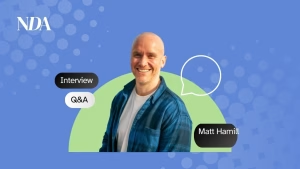Social media publisher Joe Media was founded in Ireland in 2010 before launching its UK platform in 2015. The company went into administration last year, but was soon acquired by venture capital firm Greencastle, which brought onboard a pair of Unilad execs to run the publisher.
Earlier this year, as part of a big investment push in the publisher, Greencastle appointed Samuel Regan-Asante as Joe’s UK CEO and announced plans to more than double its team of journalists, who cover sport, politics and current affairs, lifestyle, and entertainment. Greencastle also invested in a broadcast-standard studio, creating more than 20 jobs in content and video production in the process.
“The main thing that just attracted me to the opportunity was the brand heritage and where I’ve been. Obviously, my background is ex-Unilad etc. So, I’ve always worked with social-first publishers, and I’ve seen the social space develop a lot,” says Regan-Asante. “I’ve seen audience expectations change, develop, and grow. And what platforms want from publishers and how publishers effectively monetise on platforms have changed and evolved.
“Someone like myself has grown up on social platforms and gone from school and university, interacting with all my friends on social, to a stage where my friends are settling down, getting married, having kids, buying their first houses, but they’re still looking to social for news, information, and entertainment,” continues Regan-Asante. “Joe has grown with that audience and it has the credibility to keep growing the audience and giving them what they want. It’s a unique opportunity that excites me.”
A couple of months later, Joe brought in former Assistant Editor of BBC Newsbeat and Radio 1/1Xtra, Serena Kutchinsky, as Director of Editorial. Her role is to manage Joe’s growing newsroom of writers and oversee its portfolio of original shows.
“It’s the marriage of journalistic credibility and social savvy. I was working at BBC across youth audiences in news – first at BBC Three and then at Radio One 1Xtra Newsbeat. I spent a lot of time in my career working out how to engage and connect with the 18-34 audience. And, in many ways, there’s no better place to that than a publisher like Joe. That’s what attracted me,” says Kutchinsky.
“I wanted to understand the structures, the approach, the editorial strategy, and really go under the bonnet of a social-first publisher, because that’s where you really have the opportunity to speak to that audience in a very authentic voice and understand more about the habits of how people consume news and what type of news, what type of format.”
Social differences
When it comes delivering content and attracting audiences Joe has to compete with the likes of LadBible in the ‘social-first publishing’ space. However, unlike a lot of the other social publishers, Joe focuses on creating original content, rather than opting to share mostly user-generated, viral content.
Regan-Asante points to the topics the publisher covers and the amount that’s been invested in journalistic quality, which gives Joe more credibility than other publishers, as key areas of differentiation. For instance, when it comes to politics, Joe is the only social publisher on the Home Office’s daily briefing list.
Joe’s UK CEO also feels Joe is perfectly placed because “social is changing and people want deeper engagement”.
“We’ve tackled news and politics, while other social publishers have stayed away from it, but we’ve done it in a really engaging way that makes it accessible and makes younger audiences want to engage with it,” explains Regan-Asante.
“What audiences expect from publishers and platforms has changed, and they’re watching more three-minute videos, and watching more YouTube. And the technology allows us to do so with 5G, people have more bandwidth, data is cheaper than ever, phones are getting better battery life etc. And people are starting to consume longer content,” he adds.
“Joe is perfectly positioned to do that and do more originals. And we have the credibility, and our audiences are willing to engage, and that’s where our heritage is.”
It’s this content that helped Kutchinsky decide to make the switch from a ‘traditional’ publisher and broadcaster like the BBC. Despite the strong social element, the transition made a lot of sense, especially with her experience around content aimed at younger adult audience.
“The chance to do some really exciting original journalism that is targeted at, speaks for, and represents 18- to 34-year-olds in Britain today made the decision easy,” says Kutchinsky.
“The Joe audience is quite distinct. It’s people that have grown up as social natives and are now starting to move to a slightly different phase in their lives. They want to learn more about British politics, they’re thinking about mortgages, parenting, first homes. So, there’s definitely the chance to make some incredible, exciting, original journalism, and combine that with the social-first approach that excited me.”
One early example of Kutchinsky overseeing that “exciting original journalism” came last month when Joe’s Head of Politics, Oli Dugmore, got to interview Tommy Robinson’s (Stephan Yaxley-Lennon’s) former cameraman, Caolan Robertson.
The 20-minute documentary, which gave an insight into the regret Robertson feels for the far-right message he helped to create, stemmed several cutdowns – many of which are PoliticsJoe’s most-viewed clips on various platforms.
“It’s had, all-in, nearly half a million views across all platforms, and we did a long-read article off the back of it, drawing out some of the themes, looking at the psychology and philosophy of political extremism. So, that’s the kind of premium offering I would like to roll out across all verticals,” Kutchinsky shares.
Part two here.










